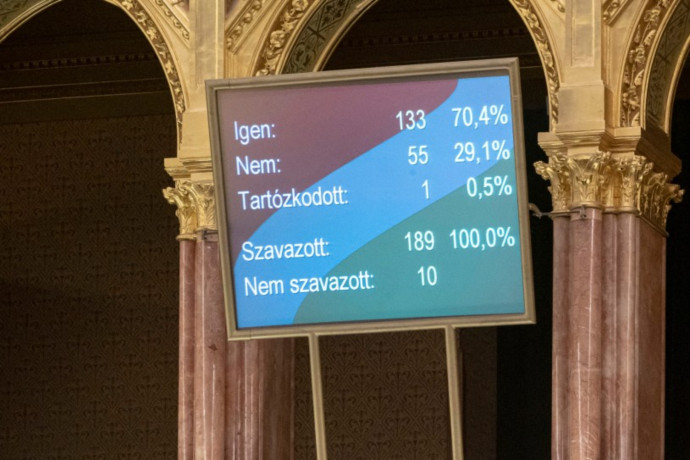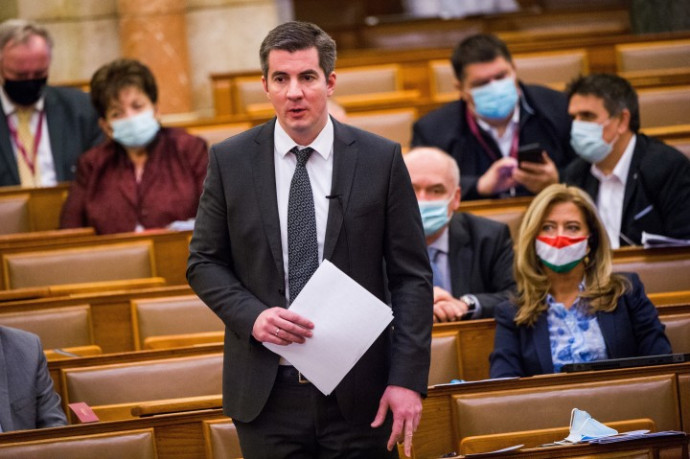
The Hungarian parliament has, as expected, extended the ‘state of danger’ legislation — the special decrees passed in response to the pandemic emergency —by a two thirds majority on Monday. On the government side 133 MPs voted in favour, while no one from the opposition benches gave their support. Translation by Charles Hebbert.
After the special legislation expired at the beginning of February, the Hungarian government exercised its power to extend the emergency decrees for 15 days, before asking parliament to approve a 90-day extension on account of the continuing coronavirus pandemic. Since it is now apparent that Hungary is enduring a third wave, the pandemic looks set to continue for a while.
Despite the serious political arguments that preceded the vote, the Constitution gives the government the power to order and terminate a state of danger without needing parliamentary approval. Fidesz nonetheless asked the MPs to approve that the earlier decrees be valid for a further 90 days.
Recognition in law of the government’s efforts
Fidesz justified the motion to extend the state of danger by saying that the government’s primary aim is “to protect the lives and health of the Hungarian people, to mitigate the economic damage and to protect jobs”. For this purpose, it said, a quick and efficient decision-making process was needed. “The past few months have demonstrated that the special and temporary powers that were previously approved have served these purposes well.”
Elsewhere, Fidesz wrote that by approving the motion, "parliament gives political recognition of the steps the government has so far taken to control the pandemic”.
This is not the first extension of the decrees: parliament already voted for a three-month extension in November.
The legislation also states that by-elections and referendums cannot be held until the day after the termination of the state of danger, and those that have been arranged must be postponed. The law came into force at 11pm on its publication date, and it expires on the 90th day following its publication.
The MPs rejected an amendment put forward by the Democratic Coalition (DK) that people should be able to choose which of the available vaccinations they receive.
The opposition accuses the government of abusing its emergency powers
In parliament on Monday Viktor Orbán applauded the government’s handling of the pandemic and asked the opposition to vote for the extension of the emergency legislation. “Another upward trend [in infections] may come”, and therefore “the present regulations need to be observed strictly and consistently,” he said.
The opposition parties indicated in the debate last week that they would not vote for the extension of the state of danger as they believed that the government had abused its power in recent months.
Tamás Harangozó (MSZP) explained his party’s position by saying that the present motion differed from the November motion, which the MSZP had supported, in that Fidesz was looking for political recognition from the opposition for the past three months, when in fact it had been playing petty financial games with the local authorities.
Gergely Arató (DK) said that his party would not back the motion for several reasons. Firstly, “they were asking for post facto approval for the harmful, mistaken and ineffective measures they had taken”; secondly, the members of the government were “completely out of touch with reality, and in the last few months had proved that they were unfit to handle the pandemic and the crisis”; and thirdly, he believed that “it was not the country or the Hungarians they cared about, but their own petty-minded interests”. The DK politician said that the coalition parties were asking for authorisation to continue squandering the country’s money on their own investments, on stuffing the pockets of their favoured entrepreneurs and on hunting exhibitions [a reference to the costly Hunting and Nature Expo].
László Lóránt Keresztes (LMP) noted that in the debate they had not heard the slightest self-criticism from the coalition parties. “Are you satisfied with this situation?” he asked. “You have not used the special authorisation you were given, but abused it.” He pointed to the examples of recent amendments to the election law and the Constitution.
Péter Jakab, the chairman of the Jobbik party, criticised the government in parliament on Monday for using the authorisation they received last year to clean out the Economic Protection Fund. “You spent 80 percent of the Economic Protection Fund not on crisis management but on yourselves. On stadiums, hunting exhibitions, on Mészáros [the billionaire who started as a gas fitter in Orbán’s village], on their mates’ hotels,” said Jobbik’s candidate for the position of prime minister. “The way I see it, we don’t just need a vaccine against the coronavirus. We also need one against theft, lies and arrogance. I promise that we will develop this vaccine, and the people will administer it to you.”
Kocsis: We cannot rely on the left wing
“Once again we cannot rely on the left wing in the defence against the pandemic. Now that the third wave is here, we still need quick decisions for the sake of people’s health and to revive the economy. The Gyurcsány coalition said no to maintaining more than 70 measures. It’s lucky that it does not depend on them,” said Máté Kocsis, the parliamentary leader of Fidesz, on his Facebook page after the vote. Katalin Novák, the family affairs minister, also noted that no MPs from the opposition parties supported the motion. “There are some people who are still preventing an effective defence against the pandemic.”

Bernadett Szél, an independent MP, shared a photo from parliament on Monday. “It seems that the government does not want to do a ‘national consultation’ with the MPs. Yet there is plenty to discuss, and we have a venue too, since parliament has been operating without interruption in the midst of the pandemic — so there is no need for any such authorisation,” she said.
She said that the 133 Fidesz MPs had “boldly” given up the right to have a say in decisions on the state of danger. “I think we have a right to check on the government’s work, especially after the crisis management has been bungled at every level. The Constitution gives us the chance to do this every 15 days — every fortnight we could have expressed our view on the government’s handling of the crisis in parliament. The 90-day authorisation robs us of this right.”
Translated by Charles Hebbert